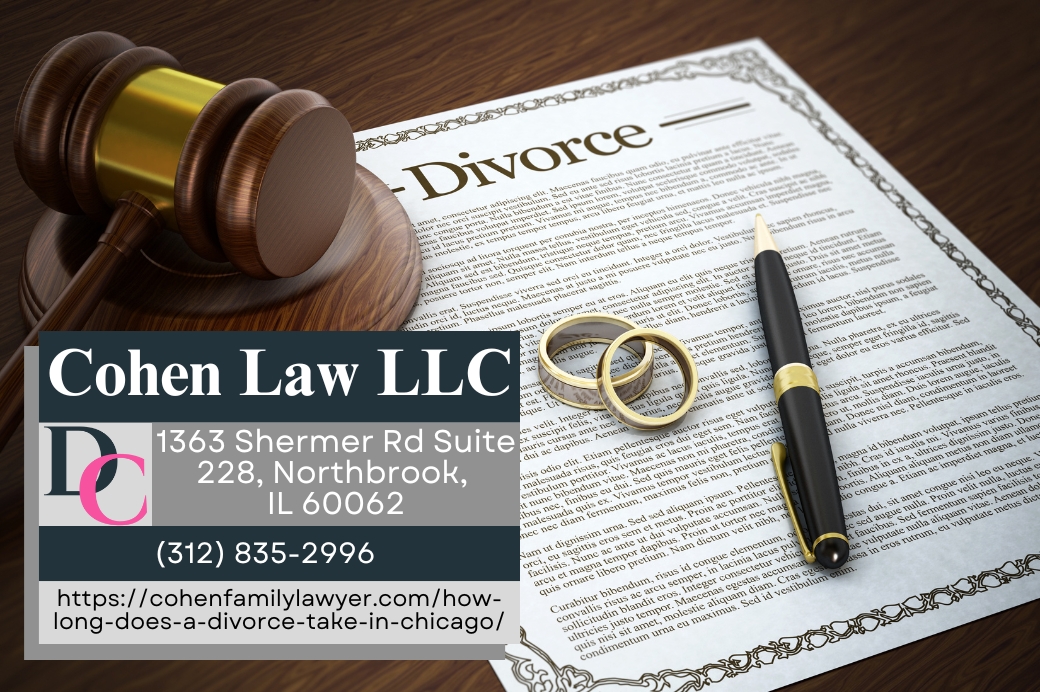Chicago divorce attorney Debbie Cohen (https://cohenfamilylawyer.com/how-long-does-a-divorce-take-in-chicago/), of Cohen Law LLC, sheds light on the various phases of the divorce process and the factors that can impact its duration. For individuals facing divorce in Chicago, understanding the expected timeline is often a top concern. This timeline can vary significantly, with some cases resolving in a few weeks, while others may take over a year.
According to the Chicago divorce attorney, the timeline of a divorce in Chicago is influenced by multiple factors, including the level of agreement between the spouses and the complexity of the issues involved. “Divorce is a significant life event, and while it’s natural to want the process to be over as quickly as possible, it’s important to understand that the timeline can be impacted by many factors, including whether the divorce is contested or uncontested,” Cohen notes.
The process begins with the filing of the divorce petition, a critical step where one spouse officially initiates the divorce by submitting the necessary paperwork to the appropriate court. At this stage, a Chicago divorce attorney such as Debbie Cohen helps ensure that all legal requirements are met and guides clients through the process. The petition, which must be filed in the county where one or both spouses reside, outlines the grounds for divorce, typically based on irreconcilable differences in Illinois.
Once the petition is filed, the next step involves serving the divorce papers to the other spouse, who is then referred to as the respondent. The respondent has a limited time to respond to the petition, either agreeing to the terms or contesting them. As Cohen explains, “The response period is crucial because it sets the tone for whether the divorce will be uncontested, where both parties agree on all terms, or contested, which often leads to a lengthier process.”
The complexity of the divorce process often escalates during the negotiation and discovery phase, where both parties exchange information regarding assets, debts, income, and other relevant details. This stage is essential for resolving issues such as property division, child custody, and spousal support. According to Debbie Cohen, “The length of this phase can vary depending on the complexity of the marital estate and the willingness of both parties to reach an agreement. A contested divorce can lead to extended negotiations or even a trial, significantly prolonging the timeline.”
Cohen also highlights that pre-trial hearings and temporary orders may be necessary in contested divorces. These hearings address temporary issues like child custody and support while the divorce is pending. “Pre-trial hearings help manage the case and can sometimes lead to settlements without the need for a full trial, which can save time and resources,” Cohen advises.
If the parties cannot reach an agreement, the divorce may proceed to trial. During this stage, both sides present evidence and arguments before a judge, who then makes the final decisions on the contested matters. This trial phase is often the most time-consuming and costly part of the divorce process, but it is sometimes necessary to resolve deeply contested issues.
Debbie Cohen emphasizes that while the process can be lengthy, there are steps individuals can take to expedite their divorce. For instance, being open to compromise and timely providing requested documents can help move the process along more quickly. Cohen also suggests considering a Joint Simplified Dissolution of Marriage for couples who meet specific criteria, such as having no children together and minimal assets. “This option can significantly shorten the divorce process, sometimes allowing it to be finalized in a matter of weeks,” Cohen notes.
Understanding the factors that affect the duration of a divorce in Chicago can help individuals better prepare for the process and set realistic expectations. Statutory requirements in Illinois, such as residency and separation requirements, play a fundamental role in determining the minimum duration of the divorce process. Additionally, the complexity of marital issues like the division of assets, child custody, and spousal support can further influence the timeline.
For those facing divorce in Chicago, seeking the guidance of an experienced divorce attorney such as Debbie Cohen is essential. Cohen Law LLC is dedicated to helping clients navigate the divorce process with care and knowledge, further ensuring that their interests are protected every step of the way. Whether dealing with a straightforward or complex case, Cohen Law LLC can provide personalized legal guidance aimed at achieving a fair and timely resolution.
About Cohen Law LLC:
Cohen Law LLC is a Chicago-based law firm well-versed in family law, including divorce, child custody, and spousal support. Led by Debbie Cohen, the firm is committed to providing personalized legal guidance to individuals navigating divorce in Illinois. Cohen Law LLC prioritizes protecting clients’ rights and achieving fair outcomes through skilled legal representation.
Embeds:
YouTube Video: https://www.youtube.com/watch?v=44a_IkWBjqU
GMB: https://www.google.com/maps?cid=16087327182504102288
Email and website
Email: debbie@cohenfamilylawyer.com
Website: https://cohenfamilylawyer.com/
Media Contact
Company Name: Cohen Law LLC
Contact Person: Debbie Cohen
Email: Send Email
Phone: (312) 835-2996
Address:1363 Shermer Rd Suite 228
City: Northbrook
State: Illinois 60062
Country: United States
Website: https://cohenfamilylawyer.com/

